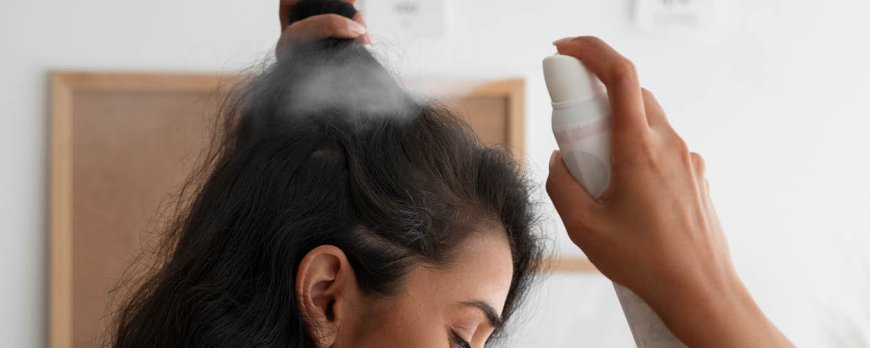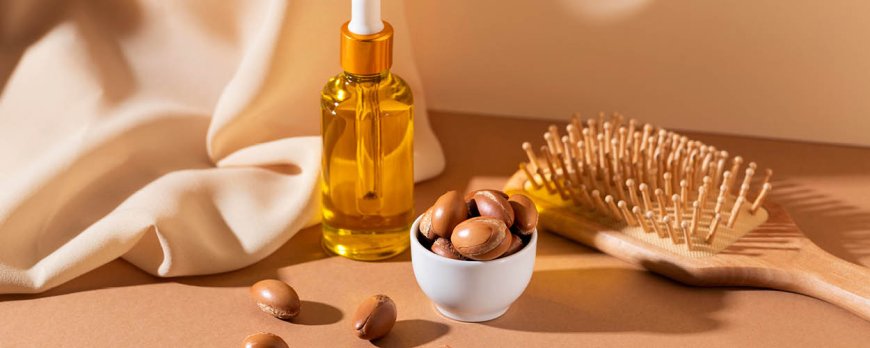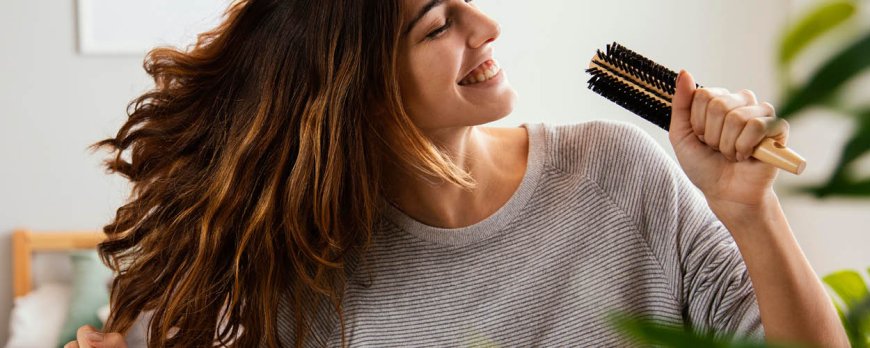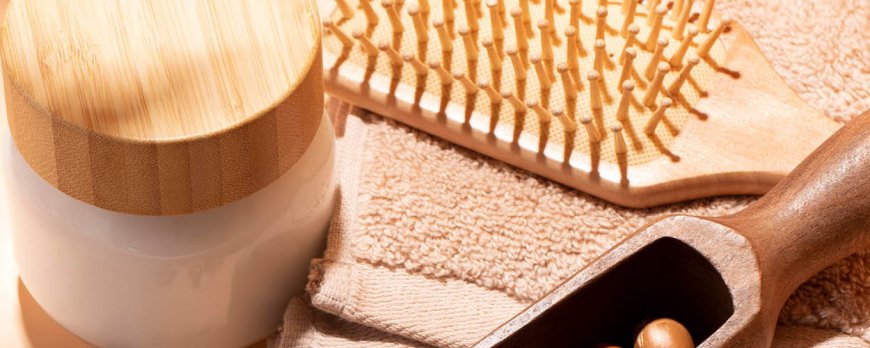What vitamin deficiency causes hair loss and brittle nails?
Discover the answer to 'What vitamin deficiency causes hair loss and brittle nails?' Learn about vitamin deficiencies, their role in hair and nail health.

What vitamin deficiency causes hair loss and brittle nails?
Hair loss and brittle nails can be caused by certain vitamin deficiencies, which can have a significant impact on overall hair and nail health. Vitamin D, biotin, iron, zinc, and selenium are some of the key vitamins and minerals that play a crucial role in maintaining healthy hair follicles and nails.
Key Takeaways:
- Vitamin D deficiency can contribute to hair loss as it is essential for healthy hair follicles.
- Biotin deficiency can also lead to hair loss and taking a biotin supplement can improve clinical hair loss.
- Iron deficiency affects the normal hair growth cycle and can result in hair thinning and loss.
- Zinc deficiency can cause hair loss, and maintaining adequate zinc levels is important for healthy hair.
- Selenium supports hair growth, but excessive intake can lead to hair loss, so it's crucial to maintain the right balance.
In addition, other vitamins and nutrients such as vitamin E, folic acid, essential fatty acids, vitamin C, and amino acids also contribute to healthy hair growth. However, excessive intake of certain vitamins like vitamin A, vitamin E, and selenium can trigger hair loss. It is important to consult with healthcare providers, maintain a balanced and nutritious diet, and address any vitamin deficiencies promptly to promote healthy hair and nail growth.
Understanding Vitamin D Deficiency and Hair Loss
Vitamin D deficiency has been linked to hair loss due to its crucial role in the formation of healthy hair follicles. This essential vitamin plays a significant role in the hair growth cycle, promoting the proliferation and differentiation of cells in the hair follicles.
When the body lacks vitamin D, it can lead to hair thinning and even hair loss. Several studies have shown a correlation between low vitamin D levels and various types of hair loss, including alopecia areata, telogen effluvium, and male and female pattern baldness.
In addition to its role in hair follicle formation, vitamin D also plays a role in maintaining hair density and promoting hair follicle regrowth. Research suggests that vitamin D receptors in the hair follicles help regulate the hair growth cycle, making it essential for overall hair health.
To address vitamin D deficiency and its potential impact on hair loss, it is advisable to maintain adequate levels of this vitamin through appropriate sun exposure and dietary sources. Additionally, consulting with healthcare providers is crucial to assess vitamin D levels and determine if supplementation is necessary to ensure optimal hair health.
The Role of Biotin in Hair Loss and Brittle Nails
Biotin, also known as vitamin B7, plays a significant role in maintaining healthy hair and nails, and its deficiency can lead to hair loss and brittle nails. This essential vitamin is responsible for supporting the production of keratin, a protein that makes up the structural component of hair and nails. When there is a lack of biotin in the body, hair follicles can become weakened and brittle, resulting in hair loss and fragile nails.
Supplementing with biotin has shown promising results in improving hair growth and strengthening nails. Research suggests that biotin supplementation can increase the thickness and volume of hair, help reduce hair shedding, and improve the overall health of nails. While more studies are needed to fully understand the impacts of biotin on hair and nail health, many individuals have reported positive outcomes from incorporating biotin supplements into their routine.
It's important to note that biotin deficiency is relatively rare, as the vitamin is widely available in many foods such as eggs, fish, nuts, and seeds. However, certain factors like pregnancy, malabsorption issues, or a diet that lacks variety can increase the risk of biotin deficiency. If you are experiencing hair loss or brittle nails, consulting with a healthcare provider is crucial to determine the underlying cause and develop an appropriate treatment plan. They can provide guidance on whether biotin supplementation is necessary and recommend the appropriate dosage for your specific needs.

Iron Deficiency and Its Impact on Hair Health
Iron deficiency can disrupt the hair growth cycle, resulting in hair thinning and eventual loss. This essential mineral plays a critical role in delivering oxygen to the hair follicles, promoting healthy hair growth. When the body lacks sufficient iron, it prioritizes the distribution of this vital nutrient to other organs, leaving the hair follicles starved of oxygen and nutrients.
In addition to oxygen delivery, iron is involved in the synthesis of collagen, a protein that forms the structural foundation of hair. Without enough iron, the structural integrity of the hair shaft weakens, leading to breakage and brittleness.
To prevent iron deficiency-related hair loss, it is crucial to ensure an adequate intake of iron-rich foods in your diet. Good dietary sources of iron include lean meats, seafood, beans, spinach, and fortified cereals. Pairing iron-rich foods with sources of vitamin C, like citrus fruits, can enhance iron absorption. For individuals who struggle to meet their iron needs through diet alone, iron supplements may be recommended under the guidance of a healthcare provider.
Signs of Iron Deficiency Hair Loss:
- Increased hair shedding, especially during showering or brushing
- Thinning hair along the hairline or on the crown of the head
- Brittle and easily breakable hair
- Slower hair growth rate
- Changes in hair texture, appearing dry and lackluster
If you suspect iron deficiency as the cause of your hair loss, it is important to consult with a healthcare provider for proper diagnosis and treatment. They may recommend blood tests to assess iron levels and provide guidance on improving iron intake or supplementation if necessary.
The Importance of Zinc for Hair Health
Zinc deficiency can lead to hair loss, and ensuring an adequate intake of this essential mineral is crucial for maintaining healthy hair. Zinc plays a vital role in DNA and protein synthesis, including the production of keratin, the protein that makes up our hair strands. It also helps to maintain the oil-secreting glands that surround our hair follicles, keeping our scalp moisturized and preventing dryness.
Furthermore, zinc plays a key role in the growth and division of hair follicle cells, promoting healthy hair growth. It also supports the immune system, which is important for maintaining a healthy scalp and preventing conditions that can contribute to hair loss.
While it's important to get zinc from our diet, certain factors can interfere with its absorption. These include high intake of phytates, which are found in some plant-based foods, as well as conditions that affect the digestive system's ability to absorb nutrients.
Ensuring an adequate intake of zinc can be achieved through a balanced diet that includes zinc-rich foods such as oysters, beef, lamb, poultry, pumpkin seeds, and spinach. If you suspect a zinc deficiency or are experiencing hair loss, it's advisable to consult with a healthcare provider who can assess your individual needs and recommend appropriate supplementation if necessary.

Selenium and Its Impact on Hair Growth
Selenium is essential for promoting healthy hair growth, but an imbalance can potentially contribute to hair loss. This trace mineral plays a vital role in the production of selenoproteins, which are enzymes that regulate various biological processes in the body, including hair growth. Selenium helps protect hair follicles from damage, strengthens hair strands, and promotes overall hair health.
However, excessive intake of selenium can have the opposite effect and lead to hair loss. It is important to maintain the right balance of selenium in your diet to reap its benefits without experiencing any adverse effects. Consult with a healthcare provider to determine the appropriate selenium intake for your specific needs.
Apart from diet, selenium can also be included in hair care products, such as shampoos and conditioners, to help nourish the scalp and promote healthy hair growth. These products can provide targeted application of selenium to the hair and scalp, optimizing its benefits for hair health.
In summary, selenium is a crucial nutrient for maintaining healthy hair growth. By ensuring a balanced intake of selenium and incorporating it into your hair care routine, you can support strong, lustrous hair and prevent the risk of hair loss.
Other Vitamins and Nutrients for Healthy Hair Growth
In addition to the previously mentioned vitamins, other nutrients such as vitamin E, folic acid, essential fatty acids, vitamin C, and amino acids are also important for promoting healthy hair growth. These nutrients play essential roles in maintaining the overall health of your hair and supporting its growth.
Vitamin E is a powerful antioxidant that helps protect the hair follicles from damage and promotes healthy blood circulation to the scalp. It also helps to keep your hair moisturized and prevents it from becoming dry and brittle.
Folic acid, also known as vitamin B9, is crucial for healthy cell division and tissue growth. It helps in the formation of red blood cells, which carry oxygen and nutrients to the hair follicles. A deficiency in folic acid can lead to poor hair quality and slow hair growth.
The Role of Essential Fatty Acids
Essential fatty acids, such as omega-3 and omega-6, are important for maintaining the health of your scalp and promoting healthy hair growth. They help to nourish the hair follicles and keep the scalp hydrated. Foods rich in essential fatty acids include fish, flaxseeds, chia seeds, and walnuts.
Vitamin C is known for its immune-boosting properties, but it also plays a role in collagen production, which is essential for strong and healthy hair. Collagen helps to strengthen the hair shaft and prevent breakage. Citrus fruits, strawberries, and bell peppers are excellent sources of vitamin C.
Amino acids are the building blocks of proteins, which are essential for hair growth. They help to strengthen the hair strands, promote elasticity, and prevent damage. Foods rich in amino acids include lean meats, fish, eggs, and legumes.
By ensuring an adequate intake of these vitamins and nutrients, you can support the overall health of your hair and promote healthy growth. However, it is always important to consult with a healthcare provider before starting any new supplements or making significant changes to your diet.

The Role of Excessive Vitamin Intake in Hair Loss
While vitamins are essential for hair health, excessive intake of certain vitamins can contribute to hair loss instead of promoting growth. It is important to strike a balance and avoid consuming excessive amounts of specific vitamins that can have adverse effects on hair health.
Here are some vitamins that, when taken excessively, can lead to hair loss:
- Vitamin A: Although vitamin A is essential for overall health, excessive intake can cause hair loss. It is important to consume vitamin A in moderation and avoid supplements that contain high levels of retinol.
- Vitamin E: While vitamin E is known for its antioxidant properties and potential benefits for hair health, excessive intake can interfere with normal blood clotting and may contribute to hair loss.
- Selenium: Selenium is a trace mineral that supports healthy hair growth, but excessive intake can lead to hair loss. It is crucial to maintain an appropriate selenium balance and avoid overconsumption through supplements or foods rich in selenium.
To prevent excessive vitamin intake and promote healthy hair growth, it is important to:
- Consult with healthcare providers: Before starting any vitamin supplementation, it is crucial to consult with healthcare providers who can assess individual needs and recommend the appropriate dosage.
- Maintain a balanced and nutritious diet: Consuming a diverse range of foods that provide a variety of essential vitamins and nutrients is the best way to support healthy hair growth. A balanced diet should include fruits, vegetables, whole grains, lean proteins, and healthy fats.
- Avoid self-diagnosis and excessive supplementation: While vitamin supplements can be beneficial for individuals with specific deficiencies, it is important to avoid self-diagnosis and excessive supplementation without professional guidance. Healthcare providers can determine the appropriate dosage and monitor the impact on hair health.
By maintaining a balanced approach to vitamin intake, individuals can support healthy hair growth and minimize the risk of hair loss caused by excessive vitamin consumption. Consulting with healthcare providers and prioritizing a nutritious diet are essential steps in promoting hair health and preventing deficiencies.

Preventing Vitamin Deficiencies for Healthy Hair and Nails
Maintaining a balanced and nutritious diet is crucial in preventing vitamin deficiencies that can negatively impact hair and nail health. By ensuring that your body receives an adequate supply of vitamins and nutrients, you can support the growth and strength of your hair and nails. Here are some tips to help you prevent vitamin deficiencies:
- Include vitamin-rich foods in your diet: Incorporate foods that are rich in the vitamins necessary for healthy hair and nails. This includes consuming foods like fatty fish, eggs, nuts, seeds, leafy green vegetables, and whole grains.
- Consider supplementation if needed: If you have difficulty meeting your nutritional needs through diet alone, you may want to consider taking vitamin supplements. However, it is important to consult with healthcare providers before starting any supplementation regimen.
- Seek professional advice: If you are experiencing persistent hair loss or brittle nails, it is crucial to seek professional advice. A healthcare provider can assess your specific situation and recommend appropriate treatments or adjustments to your diet and lifestyle.
Remember that maintaining a balanced and nutritious diet is not only important for hair and nail health but also for overall well-being. Be mindful of your vitamin intake and take steps to prevent deficiencies, as this can contribute to healthy hair and nails.
Seek Professional Advice for Hair Loss and Brittle Nails
If you are experiencing persistent hair loss or brittle nails, it is advisable to seek professional advice from a healthcare provider to determine the underlying causes. Hair loss and brittle nails can be indicators of various health issues, including vitamin deficiencies. Consulting with a healthcare professional will help identify if a vitamin deficiency is contributing to these problems and allow for proper diagnosis and treatment.
A healthcare provider will be able to assess your specific situation, conduct necessary tests, and provide personalized recommendations. They can help identify if you have a deficiency in vitamin D, biotin, iron, zinc, or selenium, which are known to be linked to hair loss and brittle nails. With their expertise, they can guide you on the appropriate course of action, whether it involves making dietary changes, taking supplements, or addressing any underlying medical conditions.
Why Professional Advice is Important
- Accurate Diagnosis: A healthcare professional can help determine the exact cause of your hair loss or brittle nails. They will consider various factors such as your medical history, lifestyle, and any underlying conditions that may be contributing to the problem.
- Personalized Treatment: Each individual is unique, and what works for one person may not work for another. By seeking professional advice, you can receive personalized treatment options that are tailored to your specific needs.
- Monitoring and Support: A healthcare provider will be able to monitor your progress and make any necessary adjustments to your treatment plan. They can offer continued support and guidance throughout your journey to healthier hair and nails.
Remember, it's important to consult with a healthcare provider before starting any new supplements or making significant changes to your diet. They can offer professional guidance to ensure that you are taking the right approach to address your hair loss or brittle nails. Taking care of your overall health, including maintaining a balanced and nutritious diet, is vital for promoting healthy hair and nail growth.
Understanding the Impact of Vitamin Deficiencies on Hair Loss and Brittle Nails
Vitamin deficiencies can have a significant impact on hair loss and brittle nails, but with proper nutrition and professional guidance, it is possible to promote healthy hair and nail growth. Several vitamins, including vitamin D, biotin, iron, zinc, and selenium, play key roles in maintaining the health of our hair and nails.
A deficiency in vitamin D, for example, has been linked to hair loss. This is because vitamin D is essential for the formation of healthy hair follicles. Without adequate levels of vitamin D, hair follicles may become weak and brittle, leading to hair loss.
Similarly, biotin deficiency is commonly associated with hair loss. Taking a biotin supplement can help improve clinical presentations of hair loss, as biotin is crucial for the production of keratin, the protein that makes up our hair and nails.
Iron deficiency can also have a negative impact on hair health. Iron is necessary for the normal hair growth cycle, and a deficiency can disrupt this cycle, leading to hair thinning and loss.
Zinc deficiency is another culprit in hair loss. Maintaining adequate levels of zinc is important for hair growth, as zinc plays a role in DNA and protein synthesis, key processes for healthy hair.
Selenium is a trace mineral that supports healthy hair growth. However, excessive intake of selenium can actually cause hair loss. It is crucial to maintain the right balance of selenium to promote healthy hair.
In addition to these specific vitamins and minerals, other nutrients like vitamin E, folic acid, essential fatty acids, vitamin C, and amino acids also contribute to healthy hair growth. However, it's important to note that excessive intake of certain vitamins, such as vitamin A, vitamin E, and selenium, can trigger hair loss.
To prevent vitamin deficiencies and promote healthy hair and nail growth, it is recommended to consult with healthcare providers and maintain a balanced and nutritious diet. They can assess your specific needs and provide appropriate guidance and recommendations.
In conclusion, while vitamin deficiencies can contribute to hair loss and brittle nails, there are steps you can take to promote healthy growth. By ensuring you have a well-rounded diet and seeking professional advice, you can support the health and vitality of your hair and nails.
FAQ
What vitamin deficiencies can cause hair loss and brittle nails?
Vitamin deficiencies, specifically deficiencies in vitamin D, biotin, iron, zinc, and selenium, can cause hair loss and brittle nails.
How does vitamin D deficiency contribute to hair loss?
Vitamin D plays a crucial role in the formation of healthy hair follicles, and its deficiency has been linked to hair loss.
What is the role of biotin in hair loss and brittle nails?
Biotin deficiency can contribute to hair loss and brittle nails. Taking a biotin supplement can improve clinical hair loss.
How does iron deficiency affect hair health?
Iron deficiency can affect the normal hair growth cycle and lead to hair thinning and loss.
What is the importance of zinc for hair health?
Zinc deficiency can cause hair loss, and maintaining zinc levels can help with hair loss prevention.
How does selenium impact hair growth?
Selenium supports healthy hair growth, but excessive selenium intake can cause hair loss, so it is important to maintain the right balance.
What other vitamins and nutrients contribute to healthy hair growth?
Other vitamins and nutrients like vitamin E, folic acid, essential fatty acids, vitamin C, and amino acids also contribute to healthy hair growth.
Can excessive intake of certain vitamins trigger hair loss?
Yes, excessive intake of vitamins like vitamin A, vitamin E, and selenium can trigger hair loss. It is important to maintain a balanced intake of vitamins.
How can I prevent vitamin deficiencies and promote healthy hair growth?
It is important to consult with healthcare providers and maintain a balanced and nutritious diet to prevent vitamin deficiencies and promote healthy hair growth.
Why is it important to seek professional advice for hair loss and brittle nails?
Persistent hair loss and brittle nails may require professional assessment. Seeking advice from healthcare providers can help determine the underlying causes and provide appropriate recommendations.
What is the impact of vitamin deficiencies on hair loss and brittle nails?
Vitamin deficiencies, including vitamin D, biotin, iron, zinc, and selenium deficiencies, can contribute to hair loss and brittle nails. Maintaining a balanced and nutritious diet is crucial to address these deficiencies and promote healthy hair and nail growth.



























































































































